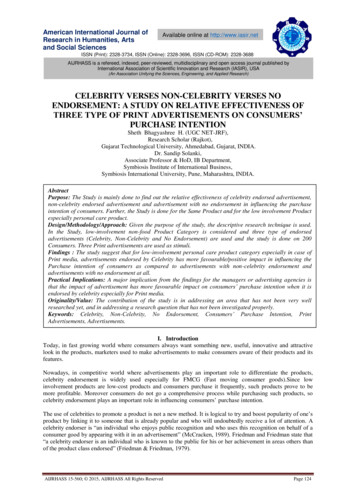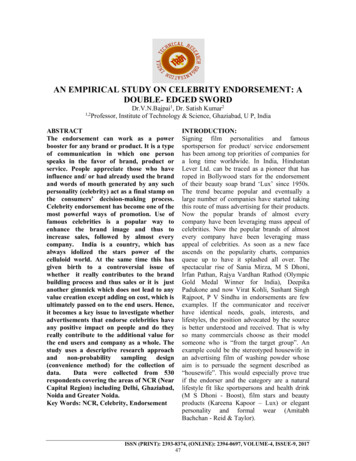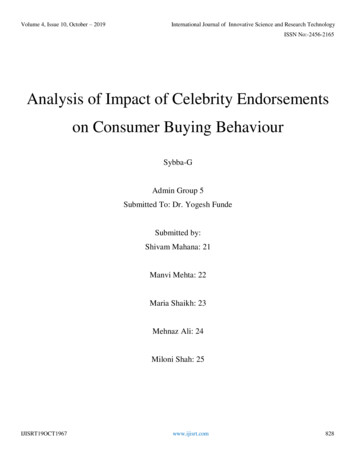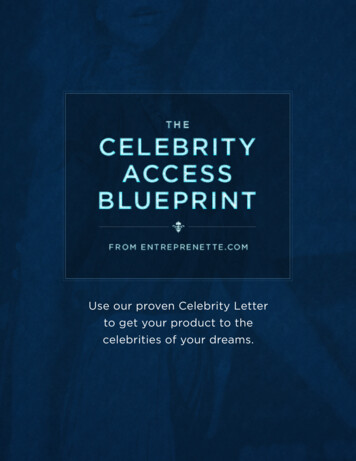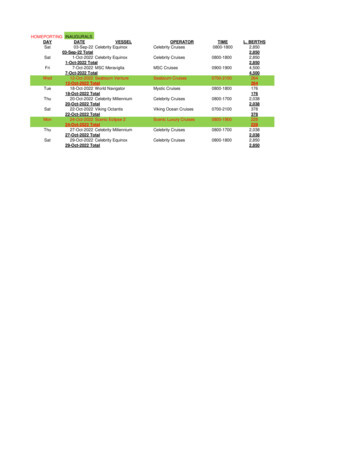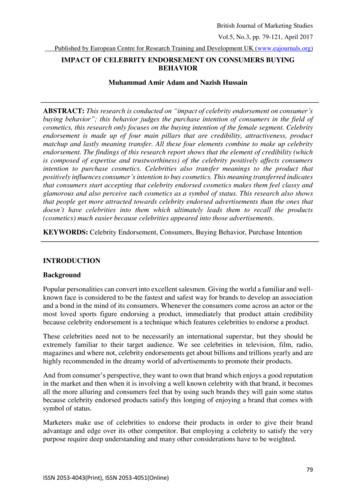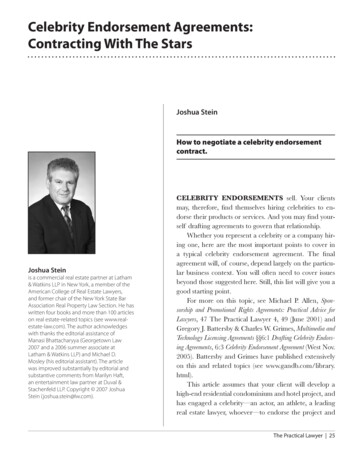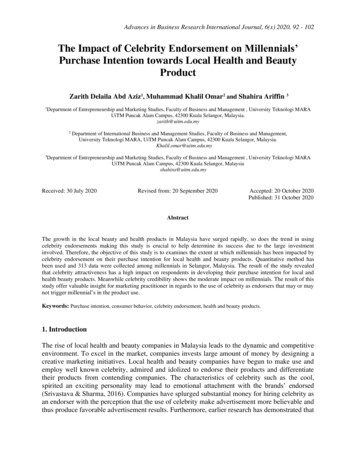
Transcription
Advances in Business Research International Journal, 6(x) 2020, 92 - 102The Impact of Celebrity Endorsement on Millennials’Purchase Intention towards Local Health and BeautyProductZarith Delaila Abd Aziz1, Muhammad Khalil Omar2 and Shahira Ariffin 31Department23Departmentof Entrepreneurship and Marketing Studies, Faculty of Business and Management , University Teknologi MARAUiTM Puncak Alam Campus, 42300 Kuala Selangor, Malaysia.zarith@uitm.edu.myDepartment of International Business and Management Studies, Faculty of Business and Management,University Teknologi MARA, UiTM Puncak Alam Campus, 42300 Kuala Selangor, Malaysia.Khalil.omar@uitm.edu.myof Entrepreneurship and Marketing Studies, Faculty of Business and Management , University Teknologi MARAUiTM Puncak Alam Campus, 42300 Kuala Selangor, Malaysiashahira@uitm.edu.myReceived: 30 July 2020Revised from: 20 September 2020Accepted: 20 October 2020Published: 31 October 2020AbstractThe growth in the local beauty and health products in Malaysia have surged rapidly, so does the trend in usingcelebrity endorsements making this study is crucial to help determine its success due to the large investmentinvolved. Therefore, the objective of this study is to examines the extent at which millennials has been impacted bycelebrity endorsement on their purchase intention for local health and beauty products. Quantitative method hasbeen used and 313 data were collected among millennials in Selangor, Malaysia. The result of the study revealedthat celebrity attractiveness has a high impact on respondents in developing their purchase intention for local andhealth beauty products. Meanwhile celebrity credibility shows the moderate impact on millennials. The result of thisstudy offer valuable insight for marketing practitioner in regards to the use of celebrity as endorsers that may or maynot trigger millennial’s in the product use.Keywords: Purchase intention, consumer behavior, celebrity endorsement, health and beauty products.1. IntroductionThe rise of local health and beauty companies in Malaysia leads to the dynamic and competitiveenvironment. To excel in the market, companies invests large amount of money by designing acreative marketing initiatives. Local health and beauty companies have begun to make use andemploy well known celebrity, admired and idolized to endorse their products and differentiatetheir products from contending companies. The characteristics of celebrity such as the cool,spirited an exciting personality may lead to emotional attachment with the brands’ endorsed(Srivastava & Sharma, 2016). Companies have splurged substantial money for hiring celebrity asan endorser with the perception that the use of celebrity make advertisement more believable andthus produce favorable advertisement results. Furthermore, earlier research has demonstrated that
Zarith Delaila, Muhammad Khalil and Shahira/Advances in Business Research International Journal, 6(2) 2020, 92 -100celebrities are impactful in promoting products and the celebrity may have a significant effect onthe associations of a brand (Munnukka, Uusitalo, & Toivonen, 2016). This is the reason whycompanies using celebrities as their brand endorser. For instance, Safi, a health and beauty brandhas been using several celebrities such as Fazura, Ayda Jebat, Fattah Amin, Nora Danish, andcurrently Sarah Hilderbrand as their brand ambassador.As a role model for young consumer, celebrity may influence young consumer in makingdecision to purchase health and beauty products (Ahmad, Rahman, & Rahman, 2015).Advertisement said to become more effective with the use of familiar celebrity (McCormic,2016) and their role are more important to influence consumers. However, celebrity endorsementalso found to have a negative effect on the behavior of consumers and failed to deliver valuewhen the endorsed celebrity involved in any illegal activities or scandals (Carlson, Donavan,Deitz, Bauer, & Lala, 2020). Negative information leads to negative perception of the endorsedproducts as well as negatively affect the companies’ performance and sales (McCartney, 2014).In addition to this, celebrities may also overshadow the brand and it does not automaticallybenefit the brands thus may impair brand recall (Zhou & Whitla, 2013).The above mentioned problems leads to the point to the purpose of this study with the aim to (1)determine the demographic profile of millennials in Selangor responded in this study and (2) toinvestigate the extent at which celebrity endorsement affect millennial’s purchase intention onlocal health and beauty products. The findings of this study will be useful to help practitioner andacademician to find out the impactful factors in celebrity endorsement dimensions that influencethe millennial’s purchase intention.2. Literature Reviews2.1 Celebrity endorsement and purchase intentionMarketers actively seek strategies intended to gain customer attention and differentiate theirbrand from competing companies. Celebrity endorsement is a universal method of modernmarketing in improving the advertisements’ effectiveness. According to Bergkvist (2016),celebrity endorsement is “an agreement between and individual who enjoys public recognitionand an entity to use the celebrity for the purpose of promoting the entity”. Previously, celebrityhas been classified into numerous group such as actors/actresses, politicians, CEO andprofessional athlete. However, recently Morimoto (2017), extend the definition of celebrity thatreal people featured on reality television shows also perceived as celebrities due to theirpopularity. For example, Jehan Musa from Raja Lawak reality shows program in Malaysia wasappointed as ambassador for Secret Skin White Kawaii Collagen brand. Many companies beganutilizing celebrity endorsement in their advertisement because they believed that the use ofcelebrities in advertisement have given them the greater and positive effect on brand, product aswell as their customers’ purchase intention particularly when celebrity endorses a single brand(Gong & Li, 2017; Illicic & Webster, 2011). The consumer may produce favorable response tothe brand-endorser when there is a positive connection with the celebrity. (Carlson, Donavan,Deitz, Bauer, & Lala, 2020).In addition, according to Yang (2018), celebrities who endorsed the brand are more likely to93
Advances in Business Research International Journal, 6(2) 2020, 92 - 100influence persuasion. For instance, a study conducted by Eren-Erdogm, Lak, and Cicek (2016)found that celebrity characteristic may influence the purchase of both non-durable and durableproducts. The intention of purchase can be influenced by the image of the endorsing celebrities(Hani, Marwan, & Andra, 2018). Celebrity endorsement may position the brand in theconsumers’ mind, retain and attract consumer attention towards the brands (Pileliene &Grigaliunaite, 2017) and thus positively affect the brand recall as well as the brand equity(Munnukka, Uusitalo, & Toivonen, 2016). In Malaysia for example, celebrity endorsement has asignificant impact on their purchase intention (Wei & Wu, 2013). However, in some cases,celebrity endorser also found to have a negative effect on buying behavior when societyassociate negative event with the celebrity endorser (Pradhan & Sethi, 2015). The unfavorableeffect may damage the sales, profit and also the company reputation. Therefore, selecting theright celebrities are very crucial in order to avoid undesirable result to the companies.2.2 Celebrity credibility and purchase intentionPrior studies have revealed that source credibility is a main factor influencing consumer attitudestowards celebrity endorsement (Gong & Li, 2017; McCormic, 2016). Celebrity credibility ispersuasive and positively affecting consumer beliefs, attitudes and opinions (Park & Lin, 2020).Celebrity credibility refers to the favorable characteristics of an endorser that may influenceconsumer’s acceptance on their message (Ohanian, 1990). Two dimensions were found in thesource credibility, i.e. expertise and trustworthiness (Jaffari & Hunjra, 2017). Singh andBanaerjee (2018) asserted that consumers may have a positive attitude towards advertised brandwhen the celebrity has a high credibility and thus influence the purchase intention. However, theeffects of celebrity credibility were affected differently by product categories (Pileliene et. al.2017; Hani et. al., 2018) and celebrity categories (Marimoto, 2018). For the product categories,the success of celebrity endorsement depending on consumer involvement on the product. Forinstance, research done by Singh & Banarjee (2020) found a negative relation for celebritycredibility and purchase intention for the high involvement product meanwhile for celebritycategories, Marimoto (2018) found that talented and unique celebrity category in Japan wasperceived less credible in over-the-counter drug advertising compared to other celebritycategories (e.g actor/actresess, athletes) and the use of female celebrities for beauty productsincrease credibility of the endorsement (McCormic, 2016).2.3 Celebrity attractiveness and purchase intentionSolomon and Michael (2017) referring celebrity attractiveness as the endorser’s physicalappearance, personality, likeability, and similarity to the consumer. Early study relate threeattributes associated to attractiveness: likeability, similarity and familiarity of the endorser andthe consumer (Ohanian, 1991). Likeability of the celebrity based on attributes such as values orphysical looks, as well as the bond of similarity where the viewer or reader feels they have orwould like to have a similar self-image of the celebrity (McCartney, 2014). The previous studystated that physically attractive spokespersons for both celebrity and non-celebrity were having apositive impact on brand attitude and buying intentions (Gong & Li, 2017; Muda, Musa, & Putit,2012). Adi (2018) claimed the consumer perception influenced by celebrity attractiveness.Physically attractive person is more successful at changing belief. Celebrity attractivenessattracts attention to the products, leading the consumer to purchase the endorsed product (Eren-94
Zarith Delaila, Muhammad Khalil and Shahira/Advances in Business Research International Journal, 6(2) 2020, 92 -100Erdogm, Lak, and Cicek, 2016). In other words, an attractive celebrity may lead to persuadeconsumer to purchase the endorsed product. However, a study conducted by Park and Lin (2020)found contradict result when celebrity attractiveness failed to influence purchase intention. Hani,Marwan and Andra (2018), in the Lebanese Jewelry settings also have shown an insignificantimpact of celebrity attractiveness and the consumer purchase intention. This finding suggestedthat the consumer tends to trust the brand rather than the celebrity who endorsed the jewelry. Itcan be explained that attractiveness not only refer to physical attractiveness (weight, height andthe beauty of the face) but it also includes other attributes such as intellectual skills, personalityproperties and lifestyle power (Erdogen, 1999).2.4 The fit between celebrity and the endorsed brand and purchase intentionCompanies invest large amount of money on celebrity endorsement with the aim to leveragecelebrity value in capturing customer attention and thus generating profit. The fit betweenproduct and the celebrity defined as the similarity or consistency between the celebrity and theproduct (Bergkvist, Hjalmarson, & Magi, 2016). According to McCormic (2016), the celebritythat fit with the endorsed brand would have a significant impact on the advertising effectivenessas well as purchase intention ( Gong & Li, 2017). When the celebrity and the brand is strong,ultimately result in greater impact on purchase intention and improve the endorsementeffectiveness (Carlson, Donavan, Deitz, Bauer & Lala, 2020). A study on millennials also shownthat they are likely to be influenced to purchase the product when there is a fit between thecelebrity and the product (McCormic, 2016). Perceptions of fit between celebrity and productincreased when celebrity acquired experience, knowledge or skills related to the product(Carlson, Donavan, Deitz, Bauer, & Lala, 2020). However, the negative effects on celebrityendorsements also has been reported due to mismatch between celebrity and the product. Thestudy done by Yoo and Jin, (2015) found that when the celebrity-product fit was low, it willnegatively affect the perceived trustworthiness and the celebrity attractiveness.3. MethodologyFor this study, quantitative approach was used to meet the research objectives. To capture therespondent’s respond, scales from past research were used to measure most of the construct.Source of credibility and source of attractiveness were relied on items from Ohanian (1991)while the fit between the celebrity and the endorsed product was measured using items suggestedby Schimdt and Hitchon (1999). The data among the millennials generational cohort from 17years old to 36 years old were collected using online survey and Malaysian celebrity wasselected for one product category: local/ domestic beauty and health produ4. Result AnalysisIn this section, results of demographic profiles and the aim of the study are presented anddiscussed thoroughly to further comprehend the purpose of the study. The respondents for thisresearch are millennials in Selangor. As shown in Table 1, out of 313 respondents, 86 were malewhich represents 27.5% and 227 were female which represents 72.5%. Then, 36.7% of95
Advances in Business Research International Journal, 6(2) 2020, 92 - 100respondents involve in this study was in age group between 22 to 26 years old. Meanwhile, theleast respondents involve in this study was in age group between 32 to 38years old with 50respondents which represent 16%. It also shows that the majority races involve in this study wereMalay with 294 respondents which represent 93.9% and the least respondents were Indian with 5respondents which represent 1.6%. Besides that, it also shows respondents with single statuswere majority respondents involved in this study with 228 respondents (72.8%). With respect toeducational background of the respondent, 213 respondents had Degree which represents 68.1%and the least respondents with PhD qualification were involved in this study with only arespondent (1.0%). Lastly, most respondents involved in this were students (50.2%) with incomeless than RM1000 per month (52.4%).Table 1: Demographic Profile of respondentsGenderAgeRaceMaritalStatusDemographic eIndiaOthersSingleHighest 513.1MarriedDivorcedSPMSTPM/ ddhismOther religionStudentBusinessHousewifeEmployedLess than RM 1000RM 1001-RM 2000RM 2001-RM 3000RM 3001 - RM 4000RM4001- RM 5000More than RM 500196
Zarith Delaila, Muhammad Khalil and Shahira/Advances in Business Research International Journal, 6(2) 2020, 92 -100Table 2 shows result of the impact of celebrity endorsements on millennials purchase intention.The findings indicate that millennials have been influenced by celebrity attractiveness in theirpurchase intention of local health and beauty products. Mostly the millennials admitted thatcelebrity’s attractiveness which is good looking of the celebrity influence them to purchase theproduct’s endorsed. Thus, the impact of celebrity attractiveness on millennials’ purchaseintention was perceived as significant. Then, the first three characteristic of celebrityendorsement that influence millennials’ purchase intention are: (1) Celebrity is good looking(µ 4.03, SD 0.784), (2) celebrity is stylish (µ 3.73, SD 0.872), and (3) the celebrity isattractive (µ 3.71, SD 0.958). Meanwhile, the lowest three characteristics of celebrity thataffect the millennial’s purchase intention are: (1) The celebrity is trustworthy (µ 3.13,SD 0.852), (2) The celebrity is expert (µ 3.13, SD 1.109), (3) The celebrity is honest (µ 3.12,SD 0.843).Table 2: Effects of celebrity endorsement on purchase intention of local health and beauty products amongmillennials in Selangor.Celebrity EndorsementCelebrity AttractivenessThis person is attractive.This person is classy.This person is good lookingThis person is stylish.This person is appealing.Celebrity CredibilityThis person is dependable.This person is honest.This person is reliable.This person is sincere.This person is trustworthy.This person is expert.This person is experienced.This person is knowledgeable.This person is qualified.This person is skilled.The Fit Between Endorser and The EndorsedProductIt makes sense that this celebrity endorses this product.The image between the endorser and the endorsedproduct are connected.The image between the endorser and the endorsedproduct are related.The image between the endorser and the endorsedproduct are linked.There is a logical connection between endorser andendorsed product.Mean (µ)Standard Deviation 991.0143.441.0213.440.9533.420.95597
Advances in Business Research International Journal, 6(2) 2020, 92 - 1005. DiscussionsThe above findings provide evidence on the impact of celebrity endorsements towardsmillennial’s purchase intention on local health and beauty product. The results highlights thatcelebrity’s attractiveness constitute as the most significant impact of celebrity endorsement onmillennial purchase intention for local health and beauty product. Most millennials perceivedthat celebrity with good looking evoked significantly on purchase intention of local health andbeauty products. This findings is consistence with a study conducted by Gong and Li (2017) whoposited that the celebrity with physically attractiveness led to the favorable attitude and had apositive impact on purchase intention.Furthermore, findings reveals that millennials attracted to the celebrity that is stylish hencecausing them to develop the purchase intention of local health and beauty products. It perhapsdue to the millennials that are extremely conscious about their look will imitate celebrity’s styleto express their self- confidence and to gain acceptance among peers.Thirdly ranked as indicated in the study is that when the celebrity is attractive it will give animpact on millennial’s purchase intention, indicating that millennials can form their purchaseintention by just viewing celebrity photo’s in the advertisement. This findings also support theresearch evidence showing an attractive celebrity may lead to persuade consumer to purchase theendorsed product (Eren-Erdogm et al., 2016).Then, the lowest ranked as perceived by millennials is associated with celebrity’s credibility. Themillennials responded when the celebrity is honest it will enhance the likelihood of purchase. Itperhaps due to the perception of millennials that they thought the celebrity’s job is to endorsedthe product and that celebrity probably doesn’t consume or use those product in their real life.This finding can relate to the prior research conducted by Singh and Banaerjee (2018), whofound that the lowest the celebrity’s credibility, the less impact imposed on consumer purchaseintention.6. ConclusionIn summary, celebrity attractiveness has the greatest impact on the millennial purchase intention.Because the celebrity in this study is a famous Malaysian actress, most millennials consideredher attractive and stylish in local health and beauty influence them. In practice, this studysuggests marketer should consider celebrity attractiveness as one of the significant cue to formconsumer purchase intention and use physically attractive celebrity to endorse and promote theirproduct which will be more effective to attract the attention of the millennials.This study further suggests on additional future research directions. Firstly, this study wasconducted at Selangor, so it is possible that the results may not be generalized to the rest ofmillennials in Malaysia. Thus, future research is suggested to conduct study for different agegroups and gender in Malaysia where more comparisons and generalizations can be made.98
Zarith Delaila, Muhammad Khalil and Shahira/Advances in Business Research International Journal, 6(2) 2020, 92 -100Second, only one celebrity was used in the study thus might influence the results. Future studyshould conduct a study on multiple celebrities in advertisements to better understand the effectsof celebrity endorsements on purchase intention.AcknowledgmentThis research is financially supported by the Ducs (Geran Dana UiTM Cawangan Selangor) andawarded by the UiTM Campus Selangor, UiTM Shah Alam, Malaysia and Ministry of HigherEducation (600-UiTMSEL(PI.5/4)(036/2018).ReferencesAdi, P.H. (2018). “Antecedents of consumers perception and its influence towards purchase intentions” Ekuitas(Jurnal Ekonomi Dan Keuangan), 19(4), 480-494. 74Ahmad, A.N., Rahman, A. A., Ab, Rahman., S. (2015). Assessing Knowledge and Religiosity on ConsumerBehavior towards Halal Food and Cosmetic Products. International Journal of Social Science andHumanity 5,10-14. , L., Hjalmarson, H., & Magi, M, A. W. (2016). A new model of how celebrity endorsement work:Attitude toward the endorsement as a mediator of celebrity source and endorsement effects. InternationalJournal of Advertising, 35 (2), 171-184. on. B. D., Donavan, T. D., Deitz., D. G., Bauer., C., & Lala., V. (2020). A customer-focused approach toimprove celebrity endorser effectiveness. Journal of Business Research.109, 048Erdogan, B., Z. (1999). Celebrity endorsement: A literature review. Journal of Marketing Management, 15 (4), 291314.Eren-Erdogm, I., Lak, H,S., & Cicek, M. (2016). Attractive or Credible Celebrities: Who Endorses Green .2016.11.085Gong, W., Li, X., (2017). Engaging fans on microblog: the synthetic influence of parasocial interaction and 2/mar.21018H,J.,Park & L,M., Lin (2020). The effects of match-ups on the consumers attitudes toward internet celebrities andtheir live streaming contents in the context on product endorsement. Journal of Retailing and ConsumerServices, 52, 101934. ni, S., Marwan, A., & Andra., A. (2018). The effect of celebrity endorsement on consumer behavior: Case of bj.2018.11.002Illicic, J., & M, Webster ,.C. (2011). Effects of multiple endorsements and consumer- celebrity attachment mj.2011.07.005Jaffari, S.I.A., & Hunjra, A.I. (2017). Mediating Impact of Celebrity Endorsement in Relationship of CelebrityCharacteristics and Consumers Purchase Intention. Abasyn Journal of Social Sciences. 10 (2), 332-344.Marimoto., M. (2018). Congruence and celebrity endorser credibility in Japanese OTC drug advertising.International Journal of Pharmaceutical and Healthcare Marketing. 12 (3), cCormic., K. (2016). Celebrity endorsements: Influence of a product-endorser match on Millennials attitudes andpurchase intentions. Journal of Retailing and Consumer Services, 32 (2016) 05.012McCartney, G., & Pinto, J.F. (2014). Influencing Chinese travel decisions. The impact of celebrity endorsementadvertising on the Chinese traveler to Macao. Journal of Vacation Marketing. 20 (3), 253- 266.https://doi.org/10.1177/135676671452420399
Advances in Business Research International Journal, 6(2) 2020, 92 - 100Muda, M., Musa, R., & Putit, L. (2012). “Breaking through the clutter in media environment: how do bspro.2012.04.201Munnukka, J., Uusitalo, O., & Toivonen, H. (2016). Credibility of a peer endorser and advertising effectiveness.Journal of Consumer Marketing, 33,182–192. https://doi.org/10.1108/JCM-11-2014-1221Ohanian, R., (1990). Construction and validation of a scale to measure celebrity endorsers’, perceived expertise,trustworthiness and attractiveness. Journal Advertisement. 19 (3) pp. 39-52.Pileliene, L., & Grigaliunaite, V. (2017). The effect of female celebrity spokesperson in FMCG advertising:neuromarketing approach. Journal of Consumer Marketing. 34 (3), 202–213. https://doi.org/10.1108/JCM02-2016-1723Pradhan, D., Duraipandian, I., & Sethi, D. (2015). Celebrity endorsement: how celebrity- brand user personalitycongruence affects brands attitude and purchase intention. Journal Marketing Communication, 7 (5), 1Schmidt, T., & Hitchon, J. (1999). When advertising and public relations converge: an application of schema theoryto the persuasive impact if alignment ads. Journalism and Mass Communication Quarterly, Vol. 76 No.3,433-455.Singh, R.P., & Banarjee, N. (2020). Exploring the Influence of Celebrity Credibility on Brand Attitude,Advertisement Attitude and Purchase Intention. Global Business Review. 19(6) Solomon & Michael R., (2017). Consumer Behavior: Buying, Having, and Being, 12th ed. New Jersey: PrenticeHall.Srivastava, K., & Sharma, N.K. (2016). Consumer perception of brand personality: An empirical evidence fromIndia. Global Business Review, 17(2), 375-388. https://doi.org/10.1177/0972150915619814Wei, K.K., & Wu, Y.L. (2013). “Measuring the impact of celebrity endorsement on consumer behavioral intentions:a study of Malaysian consumers”, International Journal of Sports Marketing & Sponsorship, Vol. 14 No. -B002Yoo, J.W., Jin, Y.J., (2015). Reverse transfer effect of celebrity-product congruence on the celebrity’s .1055046Zhou, L., & Whitla, P. (2013). How negative celebrity publicity influences consumer attitudes: The mediating 11.12.025100
Celebrity endorsement is a universal method of modern . (2016), celebrity endorsement is "an agreement between and individual who enjoys public recognition and an entity to use the celebrity for the purpose of promoting the entity". Previously, celebrity has been classified into numerous group such as actors/actresses, politicians, CEO .

